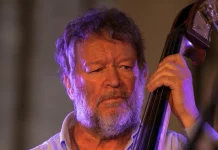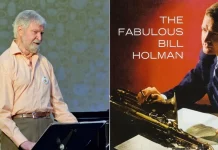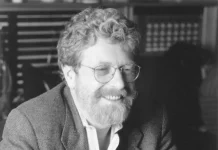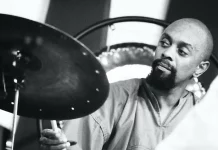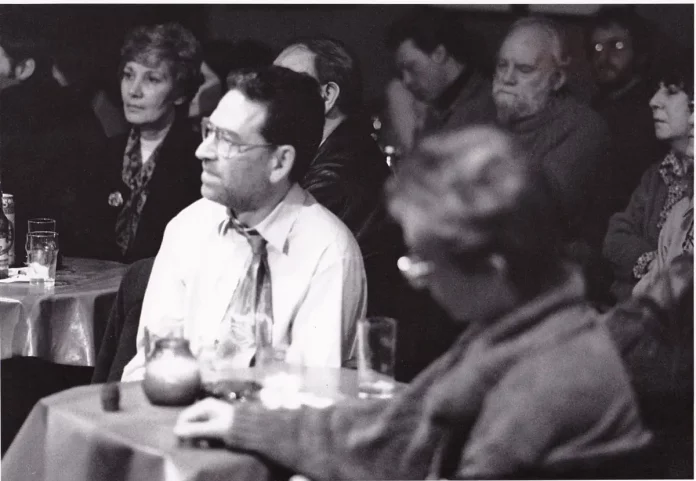
News of the the death of Victor Schonfield on 3 May 2022 was received with great sadness. He was well known for his writing (including for Jazz Journal) and for supporting and promoting areas of jazz, experimental and improvised music from the 1960s onwards. Born in the London Clinic, Marylebone, “on a quiet night in the Blitz”, 19 December 1940, he grew up and went to the same school as future poet and lyricist Pete Brown in Highgate. He later studied history at LSE.
Victor’s interest in jazz began after seeing the Louis Armstrong All Stars in 1956, and he was soon working with Brown and Michael Horovitz, organising poetry and jazz concerts. This developed into his involvement with the New Departures Quartet (with Stan Tracey and Bobby Wellins) and included their collaboration with Laurie Morgan in putting on Wellins’ Battle Of Culloden Moor at St. Pancras Town Hall in November 1961, as part of New Jazz/New Poetry, with 20 musicians and six poets.
In 1965 he was approached by Ornette Coleman to organise and promote a London concert, following their meeting in New York the previous year. As there were union restrictions on US jazz musicians performing in the UK, Victor swung it by getting Coleman to write a classical piece (Forms & Sounds) for wind quartet, as the rule didn’t apply to classical composers. This was performed in concert by The Virtuoso Ensemble at the Fairfield Hall, Croydon, followed by the Ornette Coleman Trio (with David Izenzon and Charles Moffett).
Around this time Victor started championing more improvised areas, organising events at galleries, halls and independent arts centres, many of which were part of the emerging counter-culture. His associations included the Spontaneous Music Ensemble, AMM, Terry Riley, La Monte Young, Cornelius Cardew, and in 1970 he promoted the Sun Ra Intergalactic Arkestra tour of the UK and Europe (leaving him seriously out of pocket – several came to his help financially, including Yoko Ono and John Lennon). He became an agent for Derek Bailey, Evan Parker, John Stevens and others, was director of Music Now and worked with the Contemporary Music Network, which led to concerts by Don Cherry, Anthony Braxton, The Brotherhood of Breath, Cecil Taylor, London Jazz Composers’ Orchestra, the Jazz Warriors, Gavin Bryars, and many more.
His interests were not, however, confined to the avant-garde. In his 1967 sleeve notes for Mike Westbrook’s Celebration he described the Concert Band’s music as exceptional, recognising its importance in British jazz, and in Jazz Journal in November 1984 he defended the R&B-orientated saxophonist Earl Bostic, whom he saw as not only a great technician, but, like Armstrong, someone who could communicate a “triumphant joy”: “The bottom line when it comes to music must be its power to move people, and this Earl Bostic did to the highest degree.”
Victor was a great advocate, catalyst, mentor and inspiration for many. As he once said, he supported music that was inspired by a vision of a better world, a better society, and the music was a model or paradigm of this. This reflected his political views.
Victor was also a respected teacher (at Walthamstow Technical College and London College of Printing) and started to spend more time working actively in local politics, as a trade unionist and for democratic socialism, as well as a contributor to the British Library’s Oral History Of Jazz In Britain. Throughout his life and despite the occasional setback, he remained steadfastly, and often uncompromisingly, passionate about the music he loved and was generous with his time and knowledge.
Victor’s funeral, at Kensal Green, included tributes from Evan Parker and Eddie Prevost, with recorded music, chosen by Victor himself, from The Clarke-Boland Big Band (You Stepped Out Of A Dream, 1969), The New Departures Quartet (McTaggart, 1964), Anny De Reuver & Coleman Hawkins (I Only Have Eyes For You, 1935), Spike Jones (Holiday For Strings, 1945) and Coleman Hawkins (Honeysuckle Rose, 1937).
Surely, everyone who knew Victor will remember him fondly and send thoughts and condolences to his wife Susan, sons Ernest and Malcolm, and the family.

